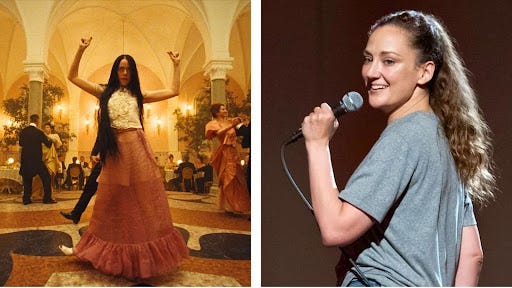"Self-appoint, Make the Rules, Claim the Throne” Cavalier Feminism in 'Poor Things’ and 'Get On Your Knees’
Despite their obvious differences, both productions present a cavalier feminism that confronts misogyny head-on, laughs it off, and keeps strutting.
There is a scene in Yorgos Lanthimos’s Poor Things in which its protagonist, Bella Baxter (Emma Stone), puts her foot down. Lounging against a banister in the dimly lit foyer of a Parisian brothel, she fidgets as a prospective client surveys her and her fellow sex workers. Stirring to action, she moves toward the madam with a halting, childlike gait and asks a simple question: “Madam Swiney, this lineup system. You really expect me to go upstairs with a man even if I find him distasteful?” “That is the way it is, my darling,” Swiney replies, gently guiding her back to her position in the tableau of bodies. But Bella is unimpressed. Invoking her adoptive father Godwin Baxter, a brilliant experimental surgeon, she declares, “As God my father says, ‘it is only the way it is until we discover the new way it is and then that is the way it is until we discover the new way it is and so it goes until the world is no longer flat, electricity lights the night, and shoes no longer are tied with ribbons.’”
Bella is living proof of this: as a briefly-dead Victorian woman who has been brought back to life with the transplanted brain of her unborn baby, no one knows as well as she does just how miraculous and fast-moving the world can be. Her journey from staggering, barely verbal science experiment to sexually voracious rabble-rouser to insatiable reader and student of the world is fraught with opposition, from her Doctor Frankenstein-esque father Godwin Baxter (Willem Dafoe), who tries to marry her off to his lab assistant Max (Ramy Youssef), to her lover Duncan Wedderburn (Mark Ruffalo), an unscrupulous solicitor who whisks her away to Lisbon. Through it all, Bella refuses to internalize the inferiority complex she’s been told she should have as a woman, choosing instead to set her own standards.
With its exploration of sexuality, existentialism, and misogyny, Poor Things, which careened into theaters in 2023 in a swirl of steampunk maximalism and fish-eye lensing, seemed like yet another installment in a recent spate of high-profile movies about being female in a man’s world. From Sarah Polley’s haunting Women Talking to Greta Gerwig’s heartfelt Barbie and even Todd Field’s controversial character study, Tár, audiences have had more opportunities than ever to see women fighting against patriarchal conventions.
But there is one major difference between Poor Things and many of the critically acclaimed feminist-inflected movies that came before it:
Keep reading with a 7-day free trial
Subscribe to Film Daze to keep reading this post and get 7 days of free access to the full post archives.




